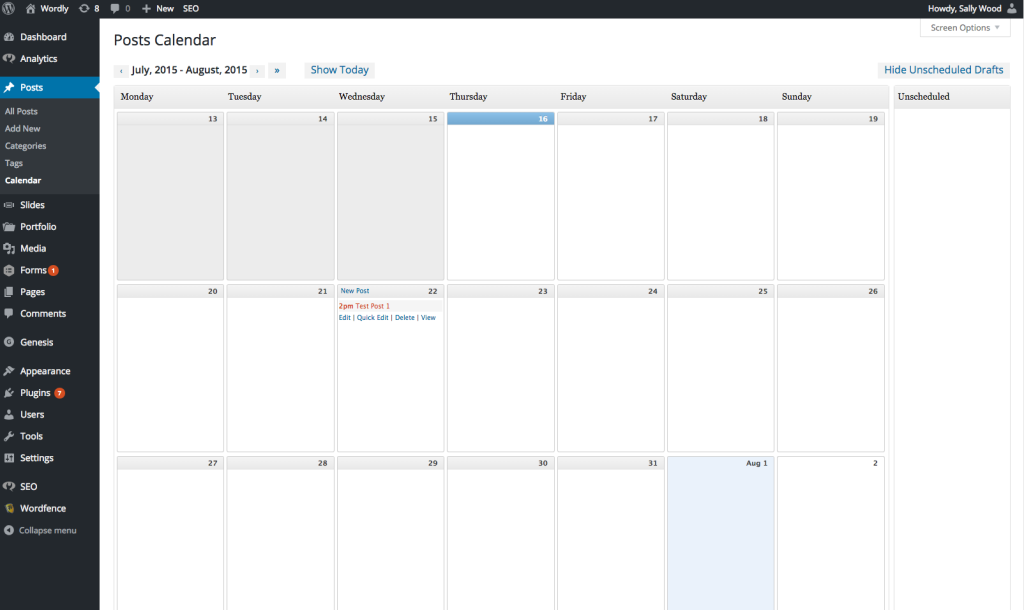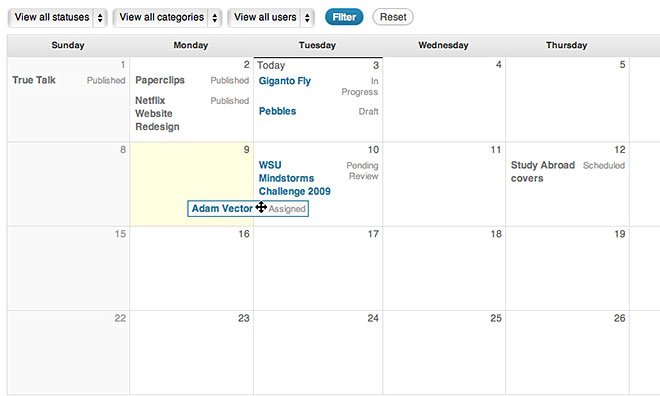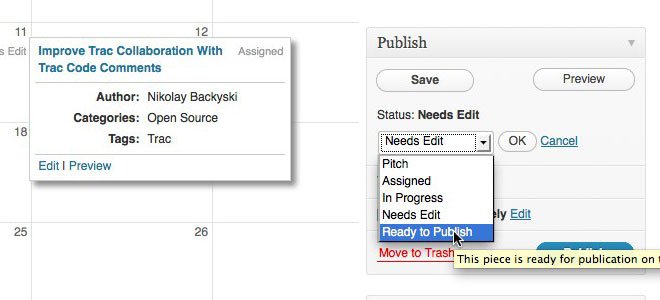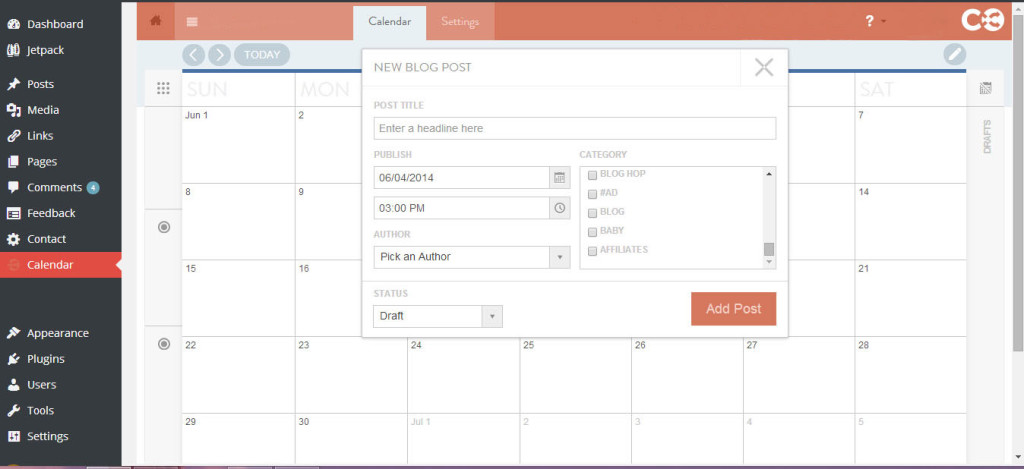What is an Editorial Calendar?
An editorial calendar is the foundation of strategic blogging. It enables you to plan ahead, and if implemented properly should go a surprisingly long way in terms of engaging your audience and growing your subscriber base.
Do You Really Need One?
Really, at the end of the day, an editorial calendar is nothing more than a schedule. Think of it like a plan, or a timetable, or a program for your blog posts. You can use it to plot out what your next month’s worth of blog posts might look like. It can helps you determine what you need to write about, how much you need to write, and where the holes or gaps in your editorial schedule might be.
Using an editorial calendar allows you to:
- Hone your forward planning: you can see, at a glance, what you should be writing about, and where your gaps might be. This allows you to easily schedule writing time into your diary.
- Stave off writers’ block: I don’t know about you, but for me, the hardest part of writing is often coming up with a relevant, meaningful, engaging topic. If you have already sat down, and done this, populating your editorial calendar in advance, then when it comes time to write, you can do just that: write.
- Go in deep: creating an editorial calendar makes you take a step back, and approach your blog from a more holistic perspective. It makes you think about your content as a whole, rather than self-contained, compartmentalised, individual posts. It allows you to approach a topic in stages, building out a series of posts to cover a specific topic more deeply; ultimately, it allows you to provide more value to your readers.
- Capitalise on SEO benefit: rather than pluck a topic at random and dash off a quick post to keep tempo with your weekly/daily/monthly posting schedule, creating an editorial calendar makes you slow down, and select more considered topics on which to write. Keyword research should part a major role in any editorial planning process. Use the keywords for which people are searching in your blog titles, headings, copy, and meta-descriptions.
WordPress Editorial Calendar Plugins
Editorial Calendar
With more than 50,000 active installs, Editorial Calendar is, far and away, the most popular editorial calendar WordPress plugin. Written in JavaScript, this plugin works by contacting your blog (when it scrolls) to collate data about your posts—it works in the same way as Google Maps.
It allows you to:
- View all your scheduled posts in the one panel, as well as the days, dates and time for when they are scheduled. It provides a very useful, holistic birds-eye-view of your scheduled posts.
- Use drag and drop functionality to alter post publishing dates. So, with one quick flick of your mouse you can move an entire post from one date to another.
- Access ‘quick edit’ functionality for post content, titles and scheduled times.
- Manually publish posts and manage draft posts.
- Quickly and easily see the status of each of your posts. There is even a column on the right-hand side of the screen that displays any drafted, but as yet unscheduled posts.
- Manage posts scheduled by multiple authors (or WordPress users), which can be particularly handy if you’re managing a large editorial or content marketing team.
One really nifty feature of the Editorial Calendar plugin is that you can set different functionality based on user permission levels. For:
- Administrators and Editors can use all the features of the calendar.
- Authors can publish, edit and reschedule their own posts, but other people’s posts remain completely locked-down.
- Contributors can save drafts and move their own posts.
- Subscribers might even be able to see the calendar.
There are some limitations to the Editorial Calendar plugin though. The current version only supports posts, not pages. And it cannot be used to move or edit posts that have already been published; it has no retroactive functionality.

Edit Flow
Where Editorial Calendar is great for small teams or individual users, Edit Flow should be the plugin of choice for large editorial departments, with a myriad of members.
Edit Flow makes it easy for editorial teams to collaborate within WordPress, offering features such as:
- Calendar: this feature works in much the same way as the Editorial Calendar plugin itself. It offers a month-by-month or a week-by-week view of all of your content. You can use drag-and-drop functionality to move and reschedule your unpublished posts, and you can even filter unpublished posts by status, category, user or post type.
- Custom Statuses: perfect for teams that have prolonged editorial cycles and peer review processes, you can set custom statuses for your posts. Out-of-the-box, WordPress only has ‘Draft’, ‘Pending Review’, and ‘Published’. The Edit Flow plugin allows you to set as many as you like, tailored specifically to your workflow. You might have ‘In Progress’, ‘Peer Review’, ‘Final Edit’, and so on. You can drag and drop the order of these statuses, and filter by these within the Calendar, to suit your workflow.
- Editorial Comments: this feature will cut down on your inbox overload quite considerably. It allows for threaded commenting within the administration area of your WordPress website (which looks a bit like comments at the end of a regular blog post) between writers and editors.
- Editorial Metadata: akin to a briefing form, this allows you to record all the important information about your blog post: when the draft is due, expected word count, topic overview, contact details, and so on. You can set which fields will be displayed on which posts.
- Notifications: set email notifications in relation to the editorial content in which you’re involved. For instance, if you’ve written a blog, you can set a notification so that you know when you editor has left feedback.
- User Groups: classify your website users into specific groups, categorised by position or department. Then, with a single click, you can send an email to the entire user group whenever a post status is changed, or editorial review is completed.
In addition, the smart cookies behind the Edit Flow plugin have written it so that it has a modular architecture and there are dozens of hooks and filters available. That means, with a little HTML help, you can modify the plugin in any which way you so desire.


CoSchedule by Todaymade
OK. So this plugin is quite unique. According to its WordPress Plugin Directory listing, it is the first and only WordPress social media editorial calendar. What does that mouthful mean? Well, it means that not only can you quickly and easily schedule your posts, but also your social media updates, all from the same drag-and-drop calendar.
Basically, you can draft and queue as many social media updates as you like, which are then automatically distributed as soon as your blog post is published. And, if you decide to change the date on which your post is due to be published (using its drag-and-drop calendar), then all your social media updates move with it. The plugin integrates with all of the major social media platforms, including Twitter, Facebook, LinkedIn, Google+, Buffer and Tmblr.
In addition, CoSchedule offers all the features built into both Editorial Calendar and Edit Flow, including a drag-and-drop calendar, and team collaboration functionality, such as the ability to designate certain tasks to specific users, and commenting.
Take a look at their video for a more in-depth explanation:
https://youtu.be/iwVtxem_A1A
CoSchedule works a little bit differently to most WordPress plugins. Given all the extra beels and whistles it offers, there is a monthly fee involved. You’ll need to sign up for an account at CoSchedule. This will require that you select one of their paid monthly plans, which range from $17 per month (for up to 15 users and 25 social profiles), through to $299 per month (for up to 80 users and 100 social profiles). Once that’s done, you can then connect your WordPress website to your CoSchedule account, giving you access to the editorial calendar, social media scheduling, and all the team features.

Conclusion
When it comes down to it, there is no one best WordPress editorial calendar plugin.
The best plugin will be the one that is most suited to your needs, and the needs of your business. If you are a one-man start-up, then Editorial Calendar might be more than adequate for your blogging or content marketing needs. If you are managing a large editorial team, then a plugin more focused on collaboration and teamwork, like Edit Flow could be the way to go. Or, if you have a bit more of a budget, and want an all-in-one editorial calendar and social media management system, with collaborative functionality built right in, CoSchedule by Todaymade could be your dream come true.
Sally has worked in marketing, communications, and PR for over 10 years. She is the Chief Wordsmith at Wordly: a copywriting and content marketing agency that works predominantly with WordPress powered websites.







